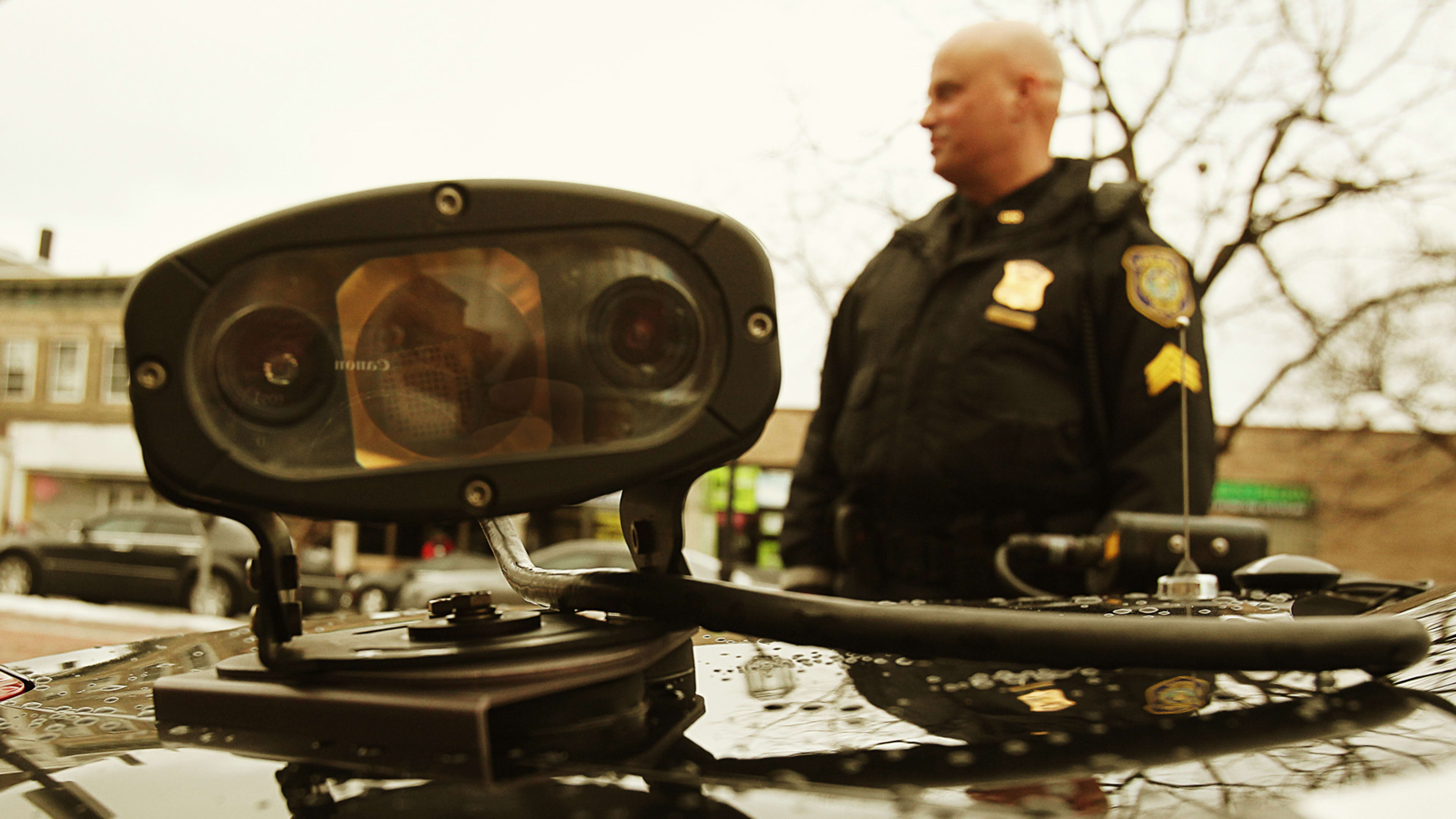Americans are deeply divided on how aggressively Immigration and Customs Enforcement should pursue undocumented residents–or on whether ICE should even exist. There is less debate, though, on whether governments should follow the law. A new investigation by the ACLU of Northern California reveals extensive surveillance cooperation between police forces and ICE that may violate local or state laws–and ICE’s own guidelines.
At issue is the legally ambiguous world of automated license plate reader (ALPR) technology–using high-speed cameras to scan plates on roads and highways, in shopping centers, and at other locations. Matching those numbers to vehicle registrations, date, time, location, and a vehicle photo can provide an intimate picture of everyone’s comings and goings–not just those of criminal suspects. Absent federal law on the technology, some states have enacted their own laws and regulations to control how the information is used.
Yet a trove of ICE documents obtained by the ACLU in a Freedom of Information lawsuit may show law enforcement agencies violating the provisions by handing license plate data over to the federal government. In some cases, this might violate cities’ or states’ so-called “sanctuary” laws that prohibit law enforcement from expending any resources on immigration enforcement. In others, the actions would violate local prohibitions on sharing data about anyone–including citizens–with outside authorities, says the ACLU.
The gathering of data may also violate ICE’s own policies regarding monitoring “sensitive” locations like churches–and it may be ensnaring the detailed location data of an untold number of non-criminal, non-immigrant Americans.
Over 80 police departments handing over data
A key example of restrictive data sharing policies is California’s 2015 law requiring notification of data breaches from license plate databases. Buried deep in the mind-numbing text of the amendment (know as SB-34) is the clause: “A public agency shall not sell, share, or transfer ALPR information, except to another public agency, and only as otherwise permitted by law.”
“Public agency” refers only to California agencies, not those of other states or the federal government, says Matt Cagle, technology and civil liberties attorney at the ACLU of Northern California.
California’s 2017 sanctuary law (SB-54) further closes the door, specifically prohibiting collaboration by any state or local agencies with federal immigration authorities.
Yet the ACLU found several California police departments on a 2018 ICE internal document that lists over 80 agencies providing ALRP “detection data” to ICE. Among them, those in the cities or counties of Merced, San Luis Obispo, Stanislaus, Union City, Upland, and Ventura. Other ICE documents show years of correspondence in which local police in Orange County sent license plate data to ICE.
These are just the California examples. The ACLU counts cooperation between ICE and departments or other agencies in over a dozen states. Fifteen other states also have laws regulating ALPR use going back to 2007, according to the National Council of State Legislatures.
Furthermore, California is just one of seven states that have passed sanctuary legislation, according to Pew. And over 170 local governments in 26 states have their own sanctuary laws, according to the Center for Immigration Studies, a nonprofit organization that supports strict immigration enforcement.
The danger of giant databases
In some cases, local police may be passing on information that they have collected on their own. But in many cases, they rely on–or supplement with–access to a multi-billion record database maintained by Vigilant Solutions. Vigilant, which was recently acquired by public safety tech giant Motorola Solutions, collects plate scan data from businesses such as insurance companies and parking lot operators, as well as from law enforcement.
ICE also has access to the Vigilant database through a contract from January 2018. (Information service Thompson Reuters facilitates the link to the database–one of many intelligence firms, along with Palantir and Giant Oak–that have come under fire for contracts with the agency.)
Jacinta Gonzalez, the field organizer for immigrant advocacy group Mijente, told me in October that ICE had in recent years managed to obtain an considerable amount of data on people. “People on the ground have been more and more [saying to us], ‘How do they have information about my taxes? How do they have information about where I drive my car?'”
Related: The data firms hired by ICE to hunt people down raise alarm about a hidden surveillance industry
Beyond law-breaking by police departments collaborating with ICE, the ACLU also alleges policy-breaking by ICE itself. A 2011 memorandum restricts ICE activity at “sensitive locations,” including schools, universities, hospitals, places of worship, funerals, weddings, demonstrations, and parades.
With such massive databases at their fingertips, “there’s no way for [ICE agents] to know, before entering the license plate, whether that search will turn up driver information near those sensitive locations,” says Cagle.
An ICE spokesperson told Quartz last July that the agency has strict privacy requirements for information collected by license plate readers, but he did not provide any details. “ICE is not seeking to build a license plate reader database, and will not collect nor contribute any data to a national public or private database,” he told the publication.
Even if the ACLU believed everyone was following all the laws, regulations, and guidelines, it would still not be pleased with the ICE’s sweeping and secretive license plate data policies.
“ICE has granted itself the power to track really anybody in the United States,” says Cagle. “ICE is grasping at a very invasive power to know where we drive and where we visit and who we visit.”
Recognize your brand’s excellence by applying to this year’s Brands That Matter Awards before the early-rate deadline, May 3.
